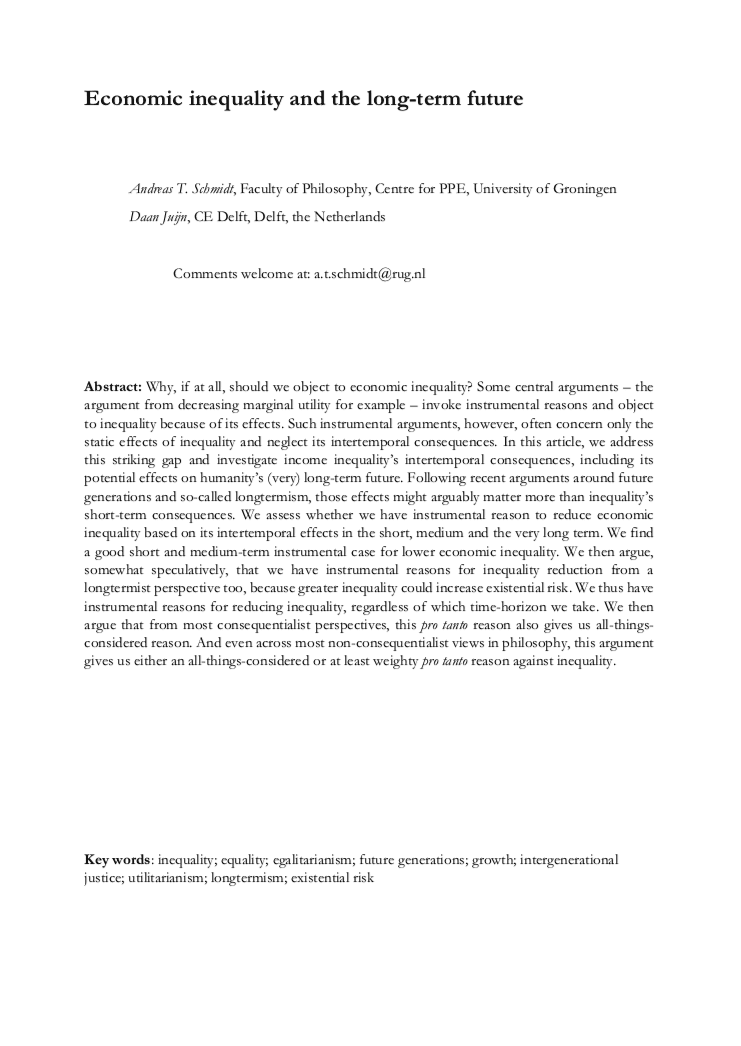Economic inequality and the long-term future
Andreas T. Schmidt (University of Groningen) and Daan Juijn (CE Delft)
GPI Working Paper No. 4-2021, published in Politics, Philosophy & Economics
Why, if at all, should we object to economic inequality? Some central arguments – the argument from decreasing marginal utility for example – invoke instrumental reasons and object to inequality because of its effects. Such instrumental arguments, however, often concern only the static effects of inequality and neglect its intertemporal consequences. In this article, we address this striking gap and investigate income inequality’s intertemporal consequences, including its potential effects on humanity’s (very) long-term future. Following recent arguments around future generations and so-called longtermism, those effects might arguably matter more than inequality’s short-term consequences. We assess whether we have instrumental reason to reduce economic inequality based on its intertemporal effects in the short, medium and the very long term. We find a good short and medium-term instrumental case for lower economic inequality. We then argue, somewhat speculatively, that we have instrumental reasons for inequality reduction from a longtermist perspective too, because greater inequality could increase existential risk. We thus have instrumental reasons for reducing inequality, regardless of which time-horizon we take. We then argue that from most consequentialist perspectives, this pro tanto reason also gives us all-things-considered reason. And even across most non-consequentialist views in philosophy, this argument gives us either an all-things-considered or at least weighty pro tanto reason against inequality.
Other working papers
Altruism in governance: Insights from randomized training – Sultan Mehmood, (New Economic School), Shaheen Naseer (Lahore School of Economics) and Daniel L. Chen (Toulouse School of Economics)
Randomizing different schools of thought in training altruism finds that training junior deputy ministers in the utility of empathy renders at least a 0.4 standard deviation increase in altruism. Treated ministers increased their perspective-taking: blood donations doubled, but only when blood banks requested their exact blood type. Perspective-taking in strategic dilemmas improved. Field measures such as orphanage visits and volunteering in impoverished schools also increased, as did their test scores in teamwork assessments…
Time discounting, consistency and special obligations: a defence of Robust Temporalism – Harry R. Lloyd (Yale University)
This paper defends the claim that mere temporal proximity always and without exception strengthens certain moral duties, including the duty to save – call this view Robust Temporalism. Although almost all other moral philosophers dismiss Robust Temporalism out of hand, I argue that it is prima facie intuitively plausible, and that it is analogous to a view about special obligations that many philosophers already accept…
In defence of fanaticism – Hayden Wilkinson (Australian National University)
Consider a decision between: 1) a certainty of a moderately good outcome, such as one additional life saved; 2) a lottery which probably gives a worse outcome, but has a tiny probability of a far better outcome (perhaps trillions of blissful lives created). Which is morally better? Expected value theory (with a plausible axiology) judges (2) as better, no matter how tiny its probability of success. But this seems fanatical. So we may be tempted to abandon expected value theory…

